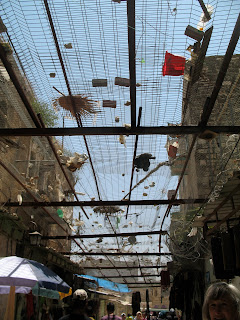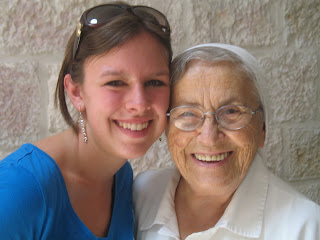
About a year and a half ago, my dad co-founded a non-profit organization to educate faith-based American leaders about the Israel-Palestine conflict. About once every two months, he takes influential American leaders over to the Holy Land, giving them a tour much richer than a typical pilgrimage to ancient, empty sites. The group meets with people of all different backgrounds- Israeli-Arabs, Jewish Israelis, Palestinian Muslims, Palestinian Christians. Government officials, non-profit owners, wealthy businessmen, community-center owners, farmers, workers. By the end of the week, the goal is to understand that each side has its rights and wrongs, has been wronged, has a claim to the land… and that taking one side or the other is detrimental and only serves to further the conflict.
I went on such a trip with my Dad this summer, eager to see what he does when he’s gone. I've seen the pictures he's taken, and heard the stories he's told, but none of the names or faces seemed real to me: they were just stories. The problem seemed distant to me, a high schooler who's more concerned about my social life than social injustice. But I was interested, if only because my dad has dedicated years to this and truly cares about the people embroiled in this conflict. We would go to Nazareth and Haifa in Galilee, Nablus, Romallah, Jerusalem, Hebron, and Bethlehem, all in a week, both in Israel and the West Bank.
Having next to no background knowledge on the subject, Dad gave me “homework” before I left: two documentaries (which I have yet to watch), and a book: Blood Brothers, by Elias Chacour. I started on the book first, thinking it was more portable, and therefore I could get it over with quickly. But once I started, I was mesmerized. Blood Brothers is no boring history of Israel for the past sixty years- instead, it’s the personal story of now Archbishop Elias Chacour, a Palestinian Christian who’s village of Biram was evacuated by the Israeli army in the late 1940s, and who has tirelessly worked for peace between Israelis and Palestinians for his whole life. It’s a fairly balanced perspective, neither pro-Israeli or pro-Palestinian (although it leans a bit towards Palestinians). After reading it, I was in awe of the life Chacour has lead, of the difference he had made in his community of Ibillin, on the thinking of others, and of his forgiveness of the Israelis, Mandela-like in it’s magnanimity. Imagine my excitement when I was told we would meet him Monday, our very first day in Israel!
Clutching Blood Brothers, I boarded the bus with the rest of the group, assuring them how much I admired Chacour, how amazing Blood Brothers was, and how excited I was to meet him. We drove from Nazareth to Haifa, a beautiful town by the Sea of Galilee. There, we entered a cool marble house, ascended the stairs to a large meeting room, and sat in wait of Chacour.
His entrance was modest, quietly shaking hands with the members of the group, but his words were anything but. His manner of speaking was surprising for an Archbishop: he’s witty, outspoken- sassy, in essence, although that isn’t a typical description of an Archbishop! He spoke clearly to us of the need for our solidarity in America. “If you have come here to be pro-Palestinian or pro-Israeli, if you have come here to take sides, I hope you have a nice trip, enjoy your time, but go home and don’t do us any more harm. But if you’ve come here and are willing to stand in solidarity with both, we need your help. Come be pro-Palestinian and pro-Israeli.”

This actually sums up the entire trip, the purpose behind the work my dad does. It was a great way to kick off the point of views we were yet to hear; the touchstone and solid foundation to which we would compare everything we heard from this point forward. And believe me, when so many different views are all compelling and all logical, it becomes very difficult to sort out everything. For instance:
In Ramallah, a West Bank town where many higher Palestinian officials are based, we met with Hanan Ashrawi, a remarkable woman who has fought for women’s rights for years and years, who is very knowledgeable and influential not only in her own country, but in the USA (she also has a Ph.D. from the University of Virginia!). She talked at length of the difficulties women in the Gaza strip have as the government now requires women to cover their heads when they go out in public, and how the public is resentful. She talked of the need for a two-state solution, that the USA must help in negotiations by supporting Israel and Palestine, by encouraging both sides to enter into negotiation there. And she spoke of how the basic human dignity of the Palestinians is violated by the Israeli military occupation of the Palestinian Territories. Ashrawi was compelling, feminine and powerful. She shared with us the stories of her children, who had been raised there but went to the USA for college. One of her daughters married while in America, and while pregnant, wanted to go back home to visit her parents. The Israelis refused to give her a visa, saying that "Jerusalem was no longer the center of her life," even though she had grown up there, her entire family lived there, it was her home, her ancestors had lived there- but because she was away for four years, she was not allowed back.
Two days later, we met with Dani Dyan, the head of the YESHA council, or the settler movement, in Jerusalem at the famous King David Hotel. After Israel took control of the West Bank and Gaza in the 1967 Six Day War, Israelis began moving into these areas and establishing "settlements," which essentially makes a two-state solution difficult. There are settlements deep in the West Bank, and the problem of what to do with them is one of the biggest obstacles to a two-state solution. A town called Hebron in the West Bank is a good example of this. For centuries, Jews and Arabs lived together in Hebron, a town of deep significance to both because this is where the Tomb of Abraham, Sarah, Isaac, Rebekah, Jacob and Leah are all located. When European Jews, with different customs, dress, and languages began arriving there in the early 1900s tensions arose. In 1927, there was a false rumor that Jews were trying to take over the Temple Mount in Jerusalem. Hearing this, several Palestinians in the Hebron area turned on the Jews of Hebron and brutally massacred 67 of them in 1927. The Jews left the village, but returned decades later, after the 1967 War, reclaiming the land of their forefathers who were murdered. About 60 families now live in the center of the town, at the cost of shutting down around 1,000 Palestinian shops, and creating streets which only Jews can be on. The town is, in effect, run by the Israeli army, divided cleanly between Jewish settlers and Palestinian. To get to the Palestinian parts of town, we had to go through a "checkpoint," meaning our passports were checked by the military and we had to walk through a scanner.



Friday nights in Jerusalem are unusually silent and peaceful, no cars or buses driving by. This is because of the holy Sabbath, the shabbat. For our shabbat, the group went to a local synagogue for services. The rooms were crowded with all ages, from the elderly to toddlers, all singing beautiful traditional Jewish songs of worship. Everyone knows these songs by heart, sings them all together in one beautiful, shouting chorus of praise and harmony. After the service, we split up into groups of two and ate the special shabbat meal with members of the synagogue. My dad and I ate with a family originally from New York, who were incredibly welcoming and gracious in opening their home and delicious meal to us! It was one of my favorite nights of the trip, as we discussed their everyday lives in the midst of conflict. Their devout faith resonated deeply throughout the evening: God was so real to them, and the complex rituals of the dinner were so important to them because of their deep symbolism. They were not simply going through the motions; they were thinking of what they did. It was a night of much laughter, delicious food, fascinating religious discussion, and stories of everyday life. They are a family I will never forget.
We visited Bethlehem Bible College in Bethlehem and heard of the work they're doing in the community, educating Christians and Muslims alike, preparing Christians for a very real vocation in the Holy Land. They just added a new building, with classrooms and a theater, to be shared with the community around them. It's a great ministry of love that's really neat to hear about. Directly from there, we visited Sister Sophie's orphanage, next to the Sisters of Charity Hospital, filled with beautiful babies from 2 months old to 5 years old. Sister Sophie loves these children, as do all the people who work there. They are so committed to creating a loving environment and finding a loving home for every child. It's vital work, requiring a lot of sacrifice- on the day we visited, the orphanage had been without running water for 25 days, as had many others in Bethlehem, due to the fact that water will shut off unexpectedly there. In the heat of August, water is vital, and they don't have easy access to it.


